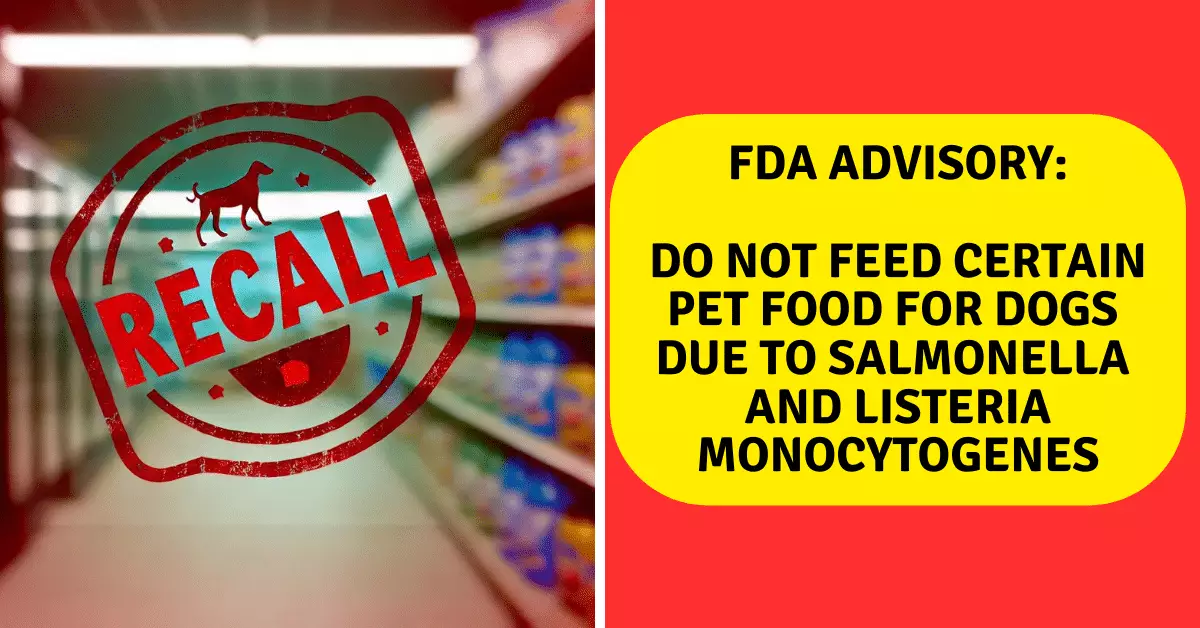Recently, the U.S. Food and Drug Administration (FDA) issued a crucial advisory regarding specific pet food products from Answers Pet Food, manufactured by Lystn LLC. This alert arose after the agency’s testing revealed that several batches of certain frozen pet food products contained harmful bacteria: Salmonella and Listeria monocytogenes (L. mono). The testing followed multiple consumer reports of illness in dogs associated with these products, underscoring the potential health risks to both pets and their human companions.
These contaminated products were marketed in 4-pound cartons and included notable formulations such as Raw Beef Detailed Formula, Raw Beef Straight Formula, and Straight Chicken Formula for dogs. The FDA has stressed that these products should not be given to pets under any circumstances. This situation accentuates the broader issue of food safety and monitoring in the pet food industry, and it highlights the essential role of regulatory bodies in safeguarding public health.
Pet owners should be particularly mindful of the risks posed by these pathogens, as they can lead to severe health issues in both animals and humans. Salmonella is notorious for causing gastrointestinal distress, with symptoms in humans such as diarrhea, fever, and abdominal cramps—often severe enough to necessitate hospitalization. Indeed, the Centers for Disease Control and Prevention (CDC) warns that individuals with compromised immune systems, young children, and the elderly are particularly susceptible to severe outcomes from Salmonella infections.
On the other hand, Listeria monocytogenes, while less frequently discussed in pet food cases, poses equally grave risks. It is particularly dangerous for pregnant women, young children, and individuals with weakened immune systems, leading to symptoms ranging from fever and muscle aches to severe complications like miscarriage or life-threatening infections. The fact that infected pets may not exhibit any symptoms compounds these risks, as they can unknowingly transmit the bacteria to their human families.
To mitigate the risks associated with the current advisory, the FDA has provided essential information for consumers to identify contaminated batches. Each affected product is labeled with a “Best Used By Date” (BUBD) sticker, aiding consumers in determining which items should be discarded. For instance, the Raw Beef Detailed Formula with a BUBD of May 06, 2026, and the Straight Chicken Formula with dates of both January 02, 2026, and March 11, 2026, are among the products flagged for concern.
Pet owners are strongly advised against feeding these items to their pets and to dispose of any remaining product securely. This precaution ensures that other animals, including wildlife, do not have access to the contaminated food. Moreover, consumers should take immediate action to clean and disinfect all surfaces that may have come into contact with these pet food products, including cooking surfaces, bowls, and storage containers.
The FDA has outlined a stringent set of guidelines for pet owners if they have previously purchased the affected products. First and foremost, throwing away any contaminated food safely is of utmost priority. It cannot be underestimated how essential it is to disinfect all pet-related supplies and surfaces that might harbor contamination. This includes cleaning areas where pet waste is disposed of, ensuring that fecal matter does not pose a risk to other animals or humans nearby.
In addition to these cleaning measures, pet owners should practice diligent personal hygiene. Always wash your hands thoroughly after handling your pet or cleaning its supplies, as this simple precaution can prevent the transmission of harmful bacteria. It is also recommended that pet owners be vigilant about observing their pets for any signs of illness—such as vomiting, diarrhea, or a decrease in appetite—and consult a veterinarian promptly if these symptoms arise.
The implications of this advisory are significant, extending beyond individual households to public health at large. Contaminated pet food is not merely a nuisance; it represents a genuine threat that can affect entire communities. The interconnectedness of animal and human health underscores the importance of proper food safety protocols within the pet food industry. Regulatory bodies like the FDA play a pivotal role in routine testing and oversight to help prevent such dangerous situations from occurring.
As pet owners, it is vital to remain aware of recalls and advisories issued by authorities. Proactive measures, such as consulting veterinary professionals when health concerns arise, can prove essential in mitigating the potential spread of these infections. Awareness and timely action can safeguard the health of both pets and their human companions.
The recent FDA advisory serves as a powerful reminder of the importance of vigilance in pet food safety. By staying informed and taking the necessary precautions, pet owners can protect their beloved animals and ensure a safer environment for all.

